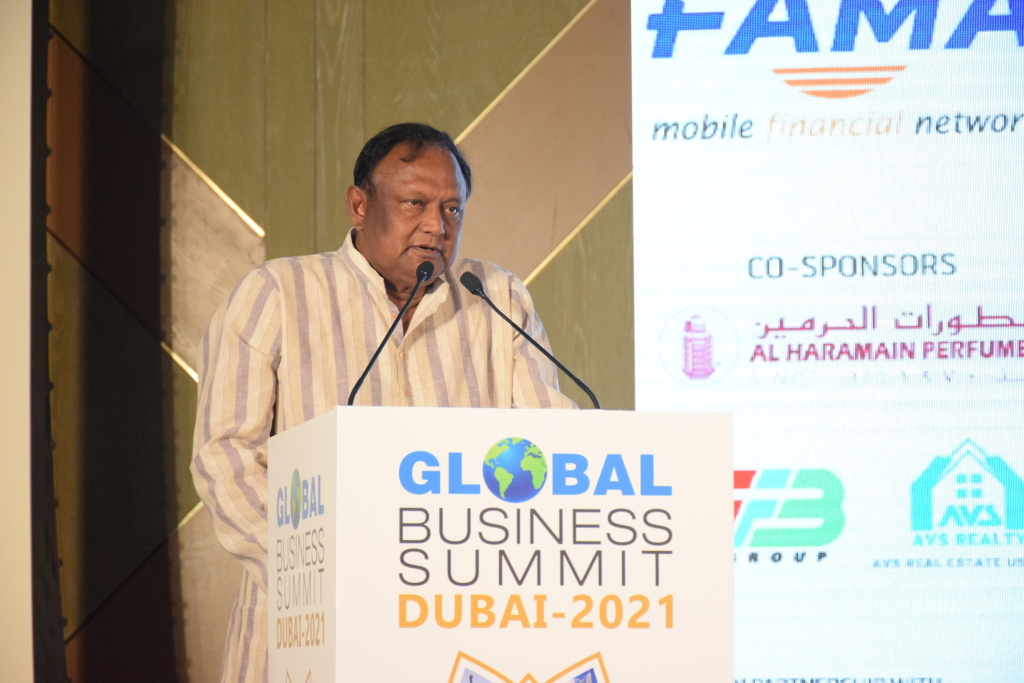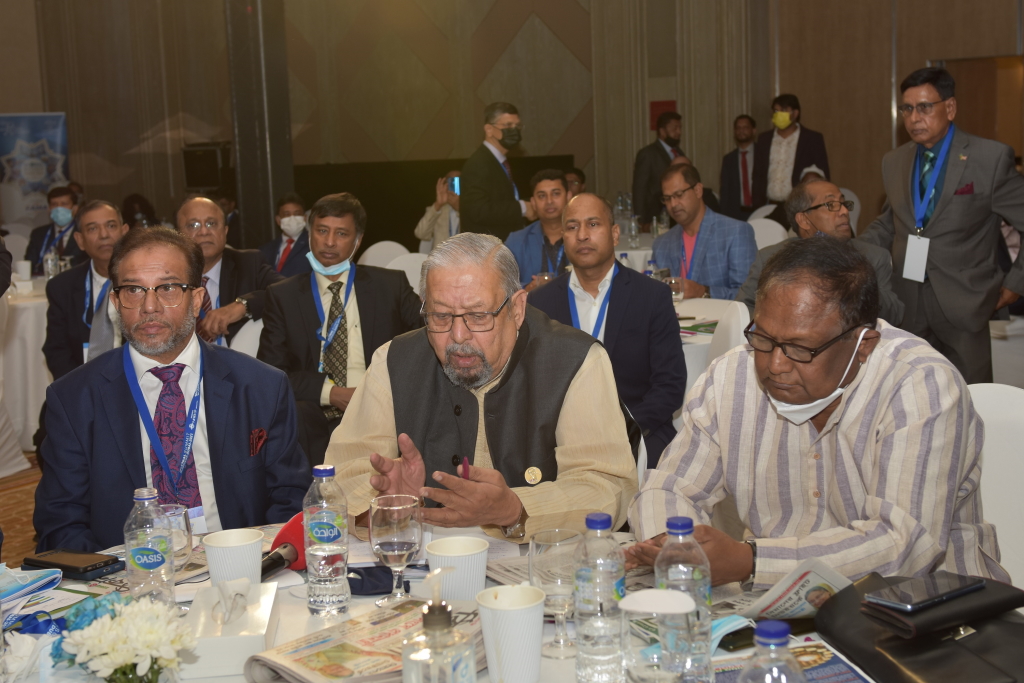The UAE, home to more than 1 million Bangladeshi expatriates, remains Bangladesh’s largest trading partner in the Middle East with two-way trade exceeds US$1.85 billion – as both countries celebrate 50 years of development
Bangladesh’s economy is poised to grow at 5.1 percent in the current fiscal year (July 2021-June 2022), according to the World Bank, after recording a resounding 5.2 percent growth in the last fiscal year ending June 30, 2021, which was the highest in Asia – at a time when the whole world was grappling with the COVID-19 pandemic.

This makes Bangladesh economy one of the most sustainable in the world – which has withstood some of the most challenging periods in recent history, including the Global Financial Crisis of 2008-09. With a per capita Gross Domestic Product (GDP) of US$2,227, Bangladesh is now ahead of its regional peers.
“Bangladesh has an impressive track record of growth and development,” World Bank said in a report. The World Bank has partnered with Bangladesh since 1972, providing more than US$35 billion in support.
“Bangladesh has been among the fastest growing economies in the world over the past decade, thanks to a demographic dividend, strong ready-made garment (RMG) exports and stable macroeconomic conditions.”
As a result, Bangladesh is on track to graduate from the UN’s Least Developed Countries (LDC) list to a Middle-Income Country in 2026. Poverty declined from 44 percent in 1991 to 15 percent in 2016. Moreover, human development outcomes improved along many dimensions, the report said.

Bangladesh’s GDP has grown 5.2 percent to US$324.24 billion last year, making it the 40th largest economy in the world, although COVID-19 has affected foreign trade that declined 11.12 percent to US$97.34 billion in 2020-2021, down from US$109.53 billion in 2019-20 financial year.
The total value of imports declined to US$64.18 billion last year from US$68.10 billion the previous year while the value of imports crossing US$33.16 in 2020-21, down from US$41.43 billion the year before.
“The Government’s pro-people policy, inclusive growth strategy and the visionary leadership of Honourable Prime Minister Sheikh Hasina that are empowering our people and the economy – are the secrets of our success,” H.E. Tipu Munshi, Commerce Minister of Bangladesh, said.
“Sheikh Hasina’s dynamic leadership has provided the country with economic, social and political stability and helped it navigate out of every crisis that we had faced in the last 12 years – making our economy more resilient and helping the country to emerge as a new economic power house.”
Bangladesh is celebrating the Golden Jubilee of the country’s independence this year along with the United Arab Emirates – as both countries gained freedom in December 1971 – just 14 days apart.
Remittances by 12 million Non-Resident Bangladeshis (NRBs) jumped 36 percent to US$24.77 billion in 2020-2021 from US$18.2 billion in 2019-2020, that pushed up foreign currency reserves from $36.0 billion in June 2020 to $48 billion in August 2021.
Bangladesh received foreign direct investment (FDI) net inflows of $2.6 billion in 2020, according to the United Nations Conference on Trade and Development (UNCTAD). Bangladesh is developing 100 economic zones that will transform the country into an economic powerhouse with massive industrialization that could push export earnings to US$100 billion by 2030.
“The Government of Prime Minister Sheikh Hasina is relentlessly working to realise the dreams of Bangabandhu Sheikh Mujibur Rahman, Father of the Nation of Bangladesh who envisioned a exploitation-free and hunger-free society,” H.E. Imran Ahmed, Minister of Expatriate Welfare and Employment, Government of Bangladesh, said at Inaugural Session of the Global Business Summit at the Crowne Plaza Hotel in Dubai, UAE on Wednesday.
“I am glad to say, part of that dream has been realised. Today, we do not have extreme poverty in Bangladesh where everyone gets to enjoy two square meals a day, have shelter and can dream of a better life.
“Our expatriates have played a great role in helping our economy. The US$24.77 billion remittance that they have sent to Bangladesh through the banking channel during pandemic, not only helped boost our foreign currency reserves to a record high, but also helped people survive and navigate out of the most challenging situation – the COVID-19 pandemic.
“Today, we are here to express our government’s sincerest appreciation to the Non-Resident Bangladeshis and to congratulate them on the 50th Anniversary of our Independence.”
The two-day Global Business Summit 2021 examines the economic miracle of Bangladesh by a panel of experts and key officials, participated by more than 200 investors, business leaders from all over the world.
Organised by NRB Commercially Important Person (CIP) Association, representing the top 150 money remitters towards Bangladesh, the event discusses ways and means to boost investment, foreign trade and remittance flow towards Bangladesh.
Every year, Bangladesh Government honours the top remitters, offering them the prestigious Commercially Important Person status that allows them certain benefits, as a mark of recognition to their contribution to the country’s economy.
Mahtabur Rahman, Chairman of NRB CIP Association, said, “NRBs are one of the largest contributors in Bangladesh economy, not only as remitters, but also as investors and importers of Bangladesh products into countries where they reside. It is the NRBs who are helping our exports to grow to a large extent.
“Going forward, NRB CIP Association will play a greater role in mobilizing international resources to help our economy.”
A number of Dubai and UAE Government officials also graced the event that is expected to increase two-way investment and trade between Bangladesh and the UAE.
UAE-Bangladesh Bilateral Trade
Despite COVID-19 pandemic, bilateral trade between Bangladesh and the UAE marginally grew to US$1.85 billion (Dh6.8 billion) in 2020-2021 financial year, up from US$1.84 billion recorded in 2018-19.
Bangladesh’s total exports to the UAE recorded a 32 percent growth to US$453.31 million (Dh1.66 billion/BTk38.59 billion) in the 2019-2020 financial year, up from US$343.50 million (Dh1.26 billion/Tk29,246,837,677) recorded in the previous 2018-19 financial year, according to the country’s Ministry of Planning, released recently.
The UAE has strengthened its position as the largest trading partner of Bangladesh in the Middle East, despite the COVID-19 pandemic, that reflects the strength and resilience of the economies of both the countries.
The UAE’s total exports to Bangladesh however marginally declined to US$1.4 billion (Dh5.11 billion/BTk118.55 billion) in 2019-2020 financial year, down from US$1.5 billion (Dh5.5 billion/ Tk127,499,444,463) recorded in 2018-19 financial year.
“These statistics show the continued growth in our bilateral relations with the UAE and the time-tested friendship that we have. Bangladesh provides the best return on investment and I take this opportunity to urge our brothers in the UAE to invest in Bangladesh,” Tipu Munshi said.
More than 1 million Bangladeshi nationals remit around US$2.5 billion (Dh9.1 million) to Bangladesh every year.
Table
Bangladesh Total Imports
| Import Statistics | 2015-16 | 2016-17 | 2017-18 | 2018-19 | 2019-20 |
| Total import (Million US$) | 49436 | 59561 | 67133 | 68103 | 64186 |
| Growth Rate (%) | 5.41 | 21.79 | 16.96 | 3.83 | -4.91 |
| Imports as Percent of GDP | 22.33 | 23.85 | 24.49 | 22.51 | 19.46 |
| Per capita imports (Tk.) | 24200 | 29134 | 33679 | 34568 | 32476 |
Bangladesh Total Exports
| Export Statistics | 2015-16 | 2016-17 | 2017-18 | 2018-19 | 2019-20 |
| Exports (Million US$) | 33661 | 37966 | 37612 | 41433 | 33164 |
| Growth Rate (%) | 9.37 | 14.01 | 2.80 | 12.75 | -19.24 |
| Exports as Percentage of GDP | 15.20 | 15.20 | 13.72 | 13.69 | 10.05 |
| Per capita exports (Tk.) | 16478 | 18571 | 18869 | 21031 | 16780 |





